Research into Hidden Chemistry Shaping Future Air Quality Earns Zhang an NSF Award
As nations cut emissions that once fueled urban smog, scientists are discovering unexpected chemistry taking place in the atmosphere.
UC Merced Professor Xuan Zhang is leading a project to uncover how these chemical shifts could affect the air we breathe and the climate. The project is supported by a National Science Foundation CAREER Award.
Zhang is the 43rd researcher from UC Merced to earn a CAREER award from the NSF.
















